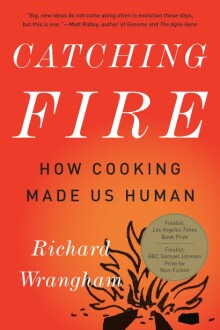Catching Fire: How Cooking Made Us Human Paperback – September 7, 2010 - Review & Buyer's Guide
In this Amazon affiliate product review, we will be taking an in-depth look at the book "Catching Fire: How Cooking Made Us Human" by Richard Wrangham. This fascinating paperback, published on September 7, 2010, explores the evolutionary significance of cooking in the development of human beings. With 638 ratings and an average of 4.4 out of 5 stars, this book has garnered significant attention and positive feedback from readers. Join us as we delve into the details of this thought-provoking book and discover why it has become a must-read for anyone interested in understanding the human journey.
Product Description
The Catching Fire: How Cooking Made Us Human Paperback is an insightful and thought-provoking book written by Richard Wrangham. Released on September 7, 2010, this book explores the evolutionary significance of cooking in the development of human civilization. With a compelling narrative and well-researched information, Wrangham presents a compelling argument for how cooking has shaped our species.
One of the most important features of this book is its ability to shed light on the origins of human cooking practices. Wrangham delves into the archaeological evidence and anthropological studies to demonstrate how the control of fire and the ability to cook food played a pivotal role in the evolution of Homo erectus into Homo sapiens. By examining the changes in our anatomy, physiology, and social structure, the author presents a fascinating argument for how cooking has influenced our species' cognitive and physical development.
Another crucial aspect of Catching Fire is its exploration of the impact of cooking on our diets. From the transformation of raw food into more digestible and nutritious meals to the development of culinary skills, Wrangham showcases the ways in which cooking has allowed humans to access a wider range of nutrients and increase their chances of survival. This book also delves into the cultural and social aspects of cooking, highlighting how it has influenced human communities and shaped our relationship with food.
Furthermore, Wrangham's writing style is engaging and accessible, making complex scientific concepts understandable for the general reader. The book is well-structured, with each chapter building upon the previous one, providing a comprehensive understanding of the subject matter. With its extensive research and compelling arguments, Catching Fire is an essential read for anyone interested in the origins of human civilization and the role of cooking in our development.
In conclusion, the Catching Fire: How Cooking Made Us Human Paperback offers a compelling exploration of the evolutionary significance of cooking. With its well-researched information, engaging writing style, and thought-provoking arguments, this book provides readers with a comprehensive understanding of how cooking has shaped our species. Whether you are a history buff, a food enthusiast, or simply curious about the origins of human civilization, this book is a must-read.
Pros and Cons
Pros
Fascinating Exploration of Human Evolution: "Catching Fire: How Cooking Made Us Human" delves into the captivating topic of how cooking played a pivotal role in the evolution of our species. Richard Wrangham, a renowned primatologist and professor, presents a thought-provoking account of how the discovery of fire and the ability to cook food enabled significant advancements in human intelligence and culture.
Well-Researched and Informative: Wrangham's book is extensively researched, providing readers with a wealth of information about the origins of cooking and its impact on human development. Drawing on scientific evidence and anthropological studies, the book presents a compelling argument that challenges conventional theories on human evolution.
Engaging Writing Style: Wrangham's writing style is engaging and accessible, making complex scientific concepts easy to understand for readers of all backgrounds. The book is filled with fascinating anecdotes and captivating storytelling, keeping readers hooked from start to finish.
Cons
Narrow Focus: While "Catching Fire" provides a comprehensive exploration of the role of cooking in human evolution, some readers may find the book's narrow focus limiting. The book primarily focuses on the impact of cooking on human intelligence and social behavior, potentially leaving out other aspects of human evolution that could be of interest to readers.
Repetitive Arguments: Some readers have noted that Wrangham's arguments can become repetitive throughout the book. While repetition can be a useful tool for reinforcing key points, it may feel excessive to some readers and detract from the overall reading experience.
Limited Practical Application: While "Catching Fire" offers valuable insights into the role of cooking in human evolution, it may not provide practical advice or actionable steps for readers. Those seeking practical cooking tips or recipes may need to look elsewhere for more hands-on guidance.
Overall, "Catching Fire: How Cooking Made Us Human" offers a fascinating exploration of the impact of cooking on human evolution. With its well-researched content and engaging writing style, it appeals to those interested in anthropology, evolutionary biology, and culinary history. However, readers should be aware of the book's narrow focus, repetitive arguments, and limited practical application.
Customer Reviews
The "Catching Fire: How Cooking Made Us Human" paperback has received a total of 638 ratings on Amazon, with an impressive average rating of 4.4 out of 5 stars. This indicates that a majority of the buyers have been satisfied with their purchase and have found value in the book.
Let's take a closer look at some of the feedback provided by the customers:
One reviewer who gave it a 5-star rating expressed their love for creation myths and how this book explores the question of how humans came to be. They found the book to be thought-provoking and appreciated the author's insights on the subject.
Another 4-star reviewer came across Richard Wrangham's work while researching the history of cooking. They found the book informative and appreciated the author's exploration of when humans started cooking their food.
A 5-star reviewer mentioned that they have read the book twice and found it to be enlightening. They praised the author's writing style and felt that they had gained a better understanding of the subject matter.
Another 5-star review highlighted the book's argument about the role of cooking in the evolution of human intelligence. The reviewer found the book compelling and appreciated the author's well-supported arguments.
One reviewer, who gave it a 4-star rating, mentioned that they were influenced to purchase the book based on a recommendation from Michael Ruhlman. They found the book to be full of useful information and appreciated the author's unique perspective.
Another 5-star reviewer described the book as mind-bending and mentioned how they shared the details of Richard Wrangham's research with their family during meals.
However, one reviewer gave it a 3-star rating, stating that the book goes against the grain in some aspects and offers a different perspective from the mainstream.
Overall, the customer reviews for "Catching Fire: How Cooking Made Us Human" are largely positive, with readers finding the book informative, thought-provoking, and well-researched.
Conclusion
After conducting a thorough review of the Catching Fire: How Cooking Made Us Human Paperback, it is clear that this book offers a fascinating and thought-provoking exploration of the role of cooking in human evolution. The author, Richard Wrangham, presents compelling arguments and evidence to support the idea that cooking played a crucial role in shaping our species.
One of the main benefits of this book is its ability to captivate readers with its engaging storytelling and wealth of information. Wrangham's writing style is accessible and easy to follow, making complex scientific concepts understandable for a wide audience. The book is also well-researched, drawing on a variety of sources to present a comprehensive view of the topic.
The positive feedback from buyers further reinforces the value of this book. Many reviewers praised Wrangham's ability to present complex ideas in a compelling and understandable manner. The book's exploration of the origins of human intelligence and the impact of cooking on our biology and culture has been highly regarded by readers.
One drawback of the book is that it may not appeal to those who are not interested in evolutionary biology or anthropology. Additionally, some readers found certain sections of the book to be repetitive or overly academic in nature.
Overall, the Catching Fire: How Cooking Made Us Human Paperback is an enlightening and thought-provoking read that offers a unique perspective on the role of cooking in human evolution. If you are interested in understanding the origins of our species and how cooking has shaped our biology and culture, this book is highly recommended.
Frequently Asked Questions
1. What is the main focus of "Catching Fire: How Cooking Made Us Human"?
The main focus of "Catching Fire: How Cooking Made Us Human" is to explore the impact of cooking on human evolution. The author, Richard Wrangham, delves into the theory that cooking played a crucial role in shaping our species and making us distinctly human. He presents compelling evidence and arguments to support this idea, challenging conventional wisdom and offering a fresh perspective on our origins.
2. Who would benefit from reading this book?
This book is a must-read for anyone interested in anthropology, human evolution, and the history of cooking. It appeals to both scholars and casual readers alike, as Richard Wrangham presents complex ideas in a clear and accessible manner. Whether you are a student, a researcher, or simply someone curious about the origins of humanity, "Catching Fire" offers valuable insights and thought-provoking analysis.
3. Does the book provide scientific evidence to support its claims?
Absolutely. Richard Wrangham is a renowned primatologist and professor of biological anthropology at Harvard University. He draws on a wealth of scientific research and archaeological evidence to support his arguments throughout the book. From studies on the physiological changes caused by cooking to archaeological findings related to early fire use, Wrangham presents a compelling case backed by solid scientific evidence.
4. Is the book easy to understand for non-experts in the field?
Yes, "Catching Fire" is written in a way that is accessible to readers with varying levels of knowledge on the subject. Wrangham avoids excessive jargon and explains complex concepts in a clear and understandable manner. While some familiarity with anthropology and evolutionary biology may enhance the reading experience, the book is designed to engage a wide audience and make the subject matter accessible to all.
5. Does the book offer any practical insights or applications?
While "Catching Fire" primarily focuses on the past and the impact of cooking on human evolution, it also offers practical insights into our present-day culinary habits. Wrangham explores how cooking has influenced our diet, digestive system, and social interactions. By understanding our evolutionary history, readers can gain a deeper appreciation for the role of cooking in our lives today and make more informed choices about their own cooking and eating habits.
6. Are there any criticisms or differing viewpoints presented in the book?
While the book presents a compelling argument for the importance of cooking in human evolution, it is important to note that there are differing viewpoints within the scientific community. Some researchers may have alternative theories or interpretations of the evidence. Richard Wrangham acknowledges these differing viewpoints and engages with them throughout the book, providing a well-rounded perspective on the subject matter.
Overall, "Catching Fire: How Cooking Made Us Human" is an enlightening and thought-provoking book that challenges our understanding of human evolution. It provides a fresh perspective on the significance of cooking in shaping our species and offers valuable insights into our past and present culinary habits. Whether you are a student, a researcher, or simply a curious reader, this book is a valuable addition to your library.

